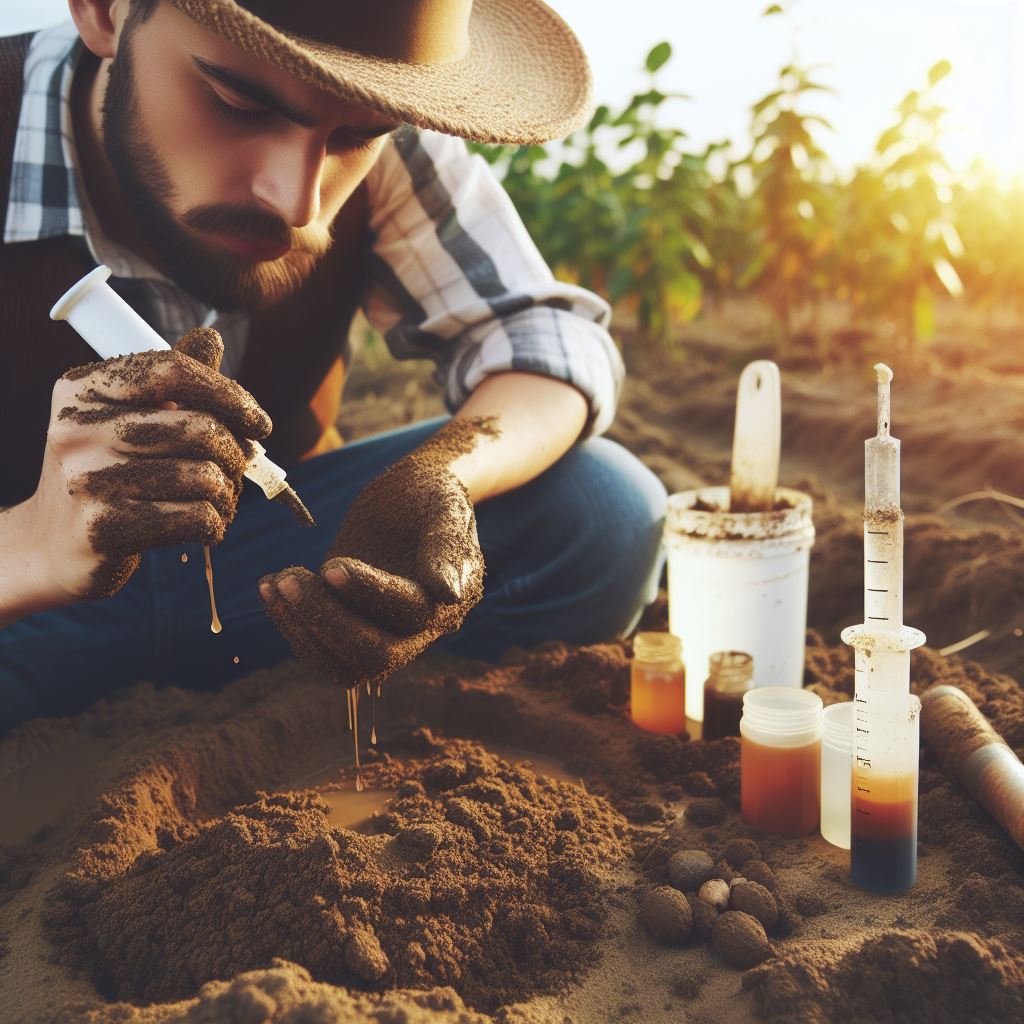Introduction
Importance of using chemical fertilizers in farms
Chemical fertilizers play a critical role in modern agriculture by ensuring optimal crop growth and increased yields.
They help replenish essential nutrients in the soil, such as nitrogen, phosphorus, and potassium, which are vital for plant growth and productivity.
Chemical fertilizers provide farmers with a cost-effective and convenient way to enhance soil fertility and address nutrient deficiencies.
Concerns and risks associated with the use of chemical fertilizers
While chemical fertilizers offer numerous benefits, their utilization also presents some concerns and potential risks.
Excessive application of chemical fertilizers can lead to nutrient imbalances in the soil, causing environmental pollution and water contamination.
Furthermore, the extensive use of chemical fertilizers may negatively impact soil health, leading to soil degradation and decreased biodiversity.
Human health can also be affected through the consumption of crops that have absorbed excessive chemical residues from fertilizers.
To mitigate these risks, farmers need to follow recommended guidelines and adopt safe practices, such as proper dosage and timing of fertilizer application.
Additionally, exploring organic and sustainable alternatives can further minimize the environmental and health impacts of chemical fertilizers.
Basically, chemical fertilizers are essential for modern agriculture but must be used with caution to ensure both agricultural productivity and environmental sustainability.
Understanding Chemical Fertilizers
Definition and purpose of chemical fertilizers
Chemical fertilizers are synthetic substances applied to soil or plants to provide essential nutrients.
They are created to enhance plant growth, increase crop yield, and improve soil fertility.
Chemical fertilizers are widely used in modern agriculture to meet the nutritional needs of plants.
Different types of chemical fertilizers
Nitrogen-based fertilizers, such as ammonium nitrate and urea, are commonly used to promote leaf and stem development.
Phosphorus-based fertilizers, including single superphosphate and triple superphosphate, support root growth and flower production.
Transform Your Agribusiness
Unlock your farm's potential with expert advice tailored to your needs. Get actionable steps that drive real results.
Get StartedPotassium-based fertilizers, like potassium chloride and potassium sulfate, aid in overall plant health and disease resistance.
Compound fertilizers, which contain a combination of nitrogen, phosphorus, and potassium, provide a balanced nutrient supply.
Nutrients provided by chemical fertilizers
Chemical fertilizers offer three primary nutrients: nitrogen (N), phosphorus (P), and potassium (K).
Nitrogen is crucial for leaf and stem development, enhancing plant growth and promoting vivid green foliage.
Phosphorus is essential for root development, seed production, and overall plant vitality.
Potassium helps regulate water uptake, enzyme activation, and overall plant health.
Additionally, chemical fertilizers may contain secondary nutrients like calcium, magnesium, and sulfur.
These nutrients play vital roles in plant metabolism, photosynthesis, and nutrient absorption.
Proper understanding of the nutrients provided by chemical fertilizers is essential for effective and safe use.
Emphasis should be placed on determining the specific needs of crops and adjusting fertilizer formulations accordingly.
Using chemical fertilizers in the right amounts and at the appropriate times can prevent nutrient imbalances and environmental damage.
By accurately identifying nutrient deficiencies and using targeted fertilization practices, farmers can optimize crop production while minimizing negative impacts.
However, it is crucial to recognize that chemical fertilizers should not be the sole source of plant nutrients.
Soil health should be maintained through organic matter additions, proper irrigation, and regular monitoring of nutrient levels.
Moreover, over-reliance on chemical fertilizers can lead to nutrient runoff, contaminating water sources and harming ecosystems.
Farmers must employ sustainable farming practices, such as crop rotation and cover cropping, to reduce dependence on chemical fertilizers.
In summary chemical fertilizers play a vital role in modern farming by providing essential nutrients to plants.
Understanding their definition, purpose, different types, and nutrient content is key to their safe and effective use.
By balancing the use of chemical fertilizers with sustainable farming practices, farmers can ensure long-term soil health and environmental sustainability.
Read: Drought-Resistant Farming: Tips & Tricks
Potential Risks of Chemical Fertilizer Use
Soil and water pollution
Chemical fertilizers can lead to soil and water pollution, degrading the quality of these essential resources.
- Leaching into groundwater: Excessive use of chemical fertilizers can cause them to leach into groundwater, contaminating drinking water sources.
- Runoff into rivers and lakes: During heavy rainfall, chemical fertilizers can be washed away, entering rivers and lakes, harming aquatic ecosystems.
- Accumulation of toxins: Chemical fertilizers often contain toxic substances which can accumulate in the soil, posing long-term risks to plants and animals.
Negative impact on biodiversity
The use of chemical fertilizers can have detrimental effects on biodiversity, disrupting delicate ecosystems.
- Loss of beneficial insects: Chemical fertilizers can harm beneficial insects, such as bees and butterflies, which are crucial for pollination.
- Disruption of soil microorganisms: Chemical fertilizers can disturb the delicate balance of soil microorganisms, essential for nutrient cycling.
- Decline in plant diversity: Excessive use of chemical fertilizers can lead to the dominance of certain plant species, reducing overall biodiversity.
Health risks for humans and livestock
Chemical fertilizers can pose health risks for both humans and livestock, potentially causing various adverse effects.
- Toxic residues in crops: Excessive use of chemical fertilizers can result in toxic residues in crops, potentially impacting human health.
- Contaminated animal feed: Livestock grazing on fields treated with chemical fertilizers may consume contaminated plants, affecting their well-being.
- Exposure to harmful chemicals: Farmers and agricultural workers who handle chemical fertilizers without proper precautions may face health hazards.
In general, the use of chemical fertilizers in farming carries potential risks that must be carefully considered. Soil and water pollution, negative impacts on biodiversity, and health risks for humans and livestock are significant concerns.
Showcase Your Farming Business
Publish your professional farming services profile on our blog for a one-time fee of $200 and reach a dedicated audience of farmers and agribusiness owners.
Publish Your ProfileIt is crucial for farmers to adopt sustainable and environmentally-friendly practices to minimize these risks and safeguard the well-being of ecosystems, agriculture, and human health.
Read: Boosting Soil Health with Organic Nutrients

Read: Mastering Palm Kernel Farming: A Complete Process Guide
Best Practices for Safe Use of Chemical Fertilizers
Agricultural farms play a crucial role in ensuring food production and meeting the demands of a growing population. However, the use of chemical fertilizers in farming practices can pose risks to both human health and the environment if not handled properly.
To mitigate these risks, it is essential for farmers to implement the following best practices:
Implementing proper storage and handling measures
- Store chemical fertilizers in a designated area away from water sources and livestock.
- Keep fertilizers in their original containers to prevent unintended mixing and potential reactions.
- Ensure containers are tightly sealed and protected from extreme weather conditions.
- Train farm workers on proper handling techniques and the use of personal protective equipment (PPE).
Adhering to recommended application rates
- Follow manufacturer’s instructions and recommended application rates to avoid overuse or underuse.
- Use calibrated equipment to ensure accurate application and avoid excess runoff.
- Consider the specific needs of different crops and adjust application rates accordingly.
Monitoring soil nutrient levels regularly
- Conduct regular soil testing to determine nutrient deficiencies or excesses.
- Based on the soil test results, adjust fertilizer application rates and types accordingly.
- Implement a nutrient management plan to optimize fertilizer use and minimize waste.
Properly timing fertilizer application
- Apply fertilizers at the right time during the crop’s growth cycle to maximize nutrient uptake.
- Consider weather conditions, crop stage, and nutrient availability in soil when determining timing.
- Avoid applying fertilizers before heavy rainfall or when there is a high risk of nutrient leaching.
Following label instructions and safety precautions
- Read the label of chemical fertilizers carefully and follow all instructions for safe use.
- Wear appropriate PPE, such as gloves and masks, when handling fertilizers.
- Avoid inhalation, ingestion, or skin contact with chemical fertilizers.
- Store and dispose of empty fertilizer containers according to local regulations.
Considering alternative, organic fertilizers when possible
- Explore the use of organic fertilizers, such as compost or manure, as an alternative to chemical fertilizers.
- Organic fertilizers can improve soil health, reduce environmental impacts, and enhance long-term fertility.
- When using organic fertilizers, ensure proper handling, storage, and application practices are followed.
By implementing these best practices, farmers can minimize the risks associated with chemical fertilizers and promote sustainable and responsible farming practices.
Safe fertilization not only protects human health but also preserves soil quality, reduces nutrient runoff, and contributes to a healthier environment.
Read: High-Tech Farming for Climate Resilience
Mitigating and Minimizing Potential Risks
In order to ensure the safe use of chemical fertilizers in farms, it is crucial to implement various measures to mitigate and minimize potential risks.
These measures include utilizing precision farming techniques and technology, implementing soil testing and nutrient management plans, establishing buffer zones around water bodies, and promoting sustainable farming practices.
Utilizing precision farming techniques and technology
Precision farming techniques such as variable rate application and GPS mapping can help farmers apply fertilizers more accurately. This reduces the risk of over-fertilization and minimizes the release of excess nutrients into the environment.
Implementing soil testing and nutrient management plans
Regular soil testing allows farmers to assess the nutrient levels in their fields and determine the appropriate amount of fertilizers needed.
By following nutrient management plans, farmers can avoid excessive fertilizer application and reduce the risk of nutrient runoff into water bodies.
Establishing buffer zones around water bodies
Buffer zones act as a protective barrier between agricultural fields and water bodies. By maintaining vegetation in these areas, the risk of fertilizer runoff into water bodies is minimized. This helps to preserve water quality and protect aquatic life.
Promoting sustainable farming practices
Sustainable farming practices such as crop rotation, cover cropping, and organic fertilization can help minimize the reliance on chemical fertilizers. These practices improve soil health, enhance nutrient cycling, and reduce the overall environmental impact of agriculture.
By adopting the above strategies, farmers can significantly reduce the potential risks associated with the use of chemical fertilizers. Precision farming techniques ensure the precise application of fertilizers, minimizing the chances of nutrient imbalance in the soil.
Soil testing and nutrient management plans enable farmers to apply fertilizers based on actual soil nutrient levels, preventing excessive use.
Establishing buffer zones around water bodies acts as a safeguard, preventing the direct entry of fertilizers into aquatic ecosystems.
Finally, promoting sustainable farming practices helps to reduce the need for synthetic fertilizers altogether, thereby minimizing the associated risks.
It is important for farmers to stay informed about the latest advancements in farming technology and techniques that can further enhance the safe use of chemical fertilizers.
They should actively participate in training programs and workshops organized by agricultural extension agencies to gain knowledge and skills in precision farming.
Regular monitoring and evaluation of soil nutrient levels and water quality is also essential to ensure that the implemented measures are effective in mitigating risks.
Essentially, mitigating and minimizing potential risks in the safe use of chemical fertilizers is crucial for sustainable and environmentally responsible farming.
By utilizing precision farming techniques, implementing soil testing and nutrient management plans, establishing buffer zones, and promoting sustainable practices, farmers can safeguard both their crops and the environment.
It is imperative for farmers to prioritize these measures and be proactive in adopting new technologies and farming practices that contribute to the responsible use of chemical fertilizers.
Read: Sustainable Crop Rotation in a New Era
Conclusion
Recap of the importance of chemical fertilizers in modern farming
Chemical fertilizers are crucial in modern farming for higher crop yields and improved food production.
Chemical fertilizers play a pivotal role in modern farming by enhancing soil fertility and crop yields. They provide essential nutrients to plants, contributing to food security and agricultural productivity.
However, their sustainable use is crucial to mitigate environmental impacts and ensure long-term agricultural viability and ecosystem health.
Emphasis on the need for responsible and safe use
It is imperative to emphasize responsible and safe utilization to protect the environment and human health.
Emphasizing responsible and safe use of chemical fertilizers in modern farming is imperative. Proper application methods, dosage control, and environmental monitoring are essential to mitigate adverse effects.
Sustainable practices ensure soil health, protect water quality, and promote long-term agricultural productivity while minimizing environmental risks and safeguarding public health.
Encourage continuous education and awareness among farmers
Continued education and awareness programs should be promoted to ensure safe practices among farmers.




